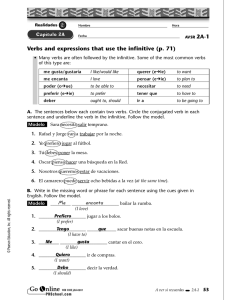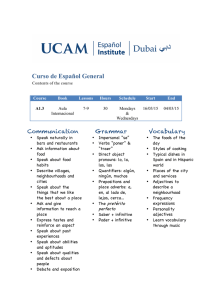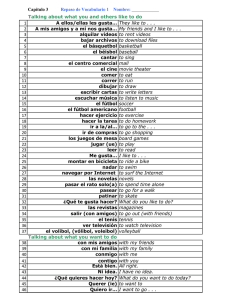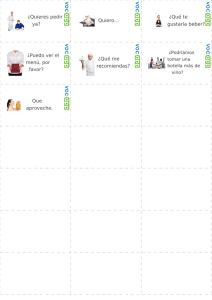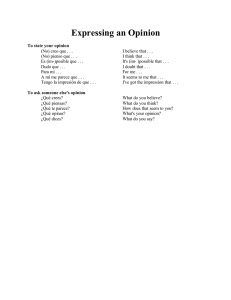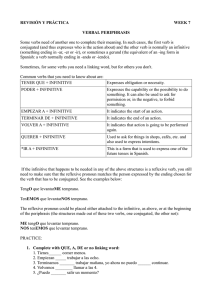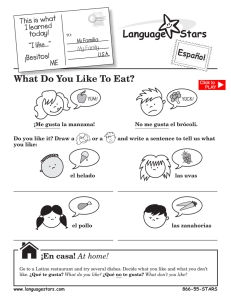LOS INFINITIVOS VERB (verbo): A verb is an ACTION
Anuncio
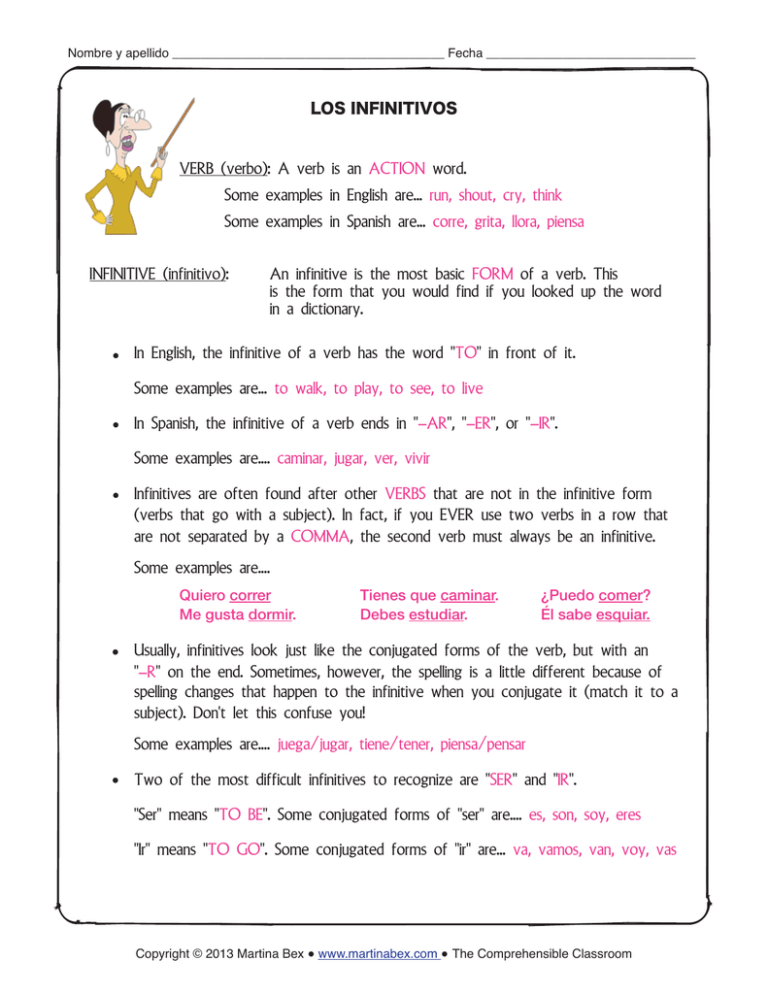
Nombre y apellido _______________________________________ Fecha ______________________________ LOS INFINITIVOS VERB (verbo): A verb is an ACTION word. Some examples in English are... run, shout, cry, think Some examples in Spanish are... corre, grita, llora, piensa INFINITIVE (infinitivo): An infinitive is the most basic FORM of a verb. This is the form that you would find if you looked up the word in a dictionary. • In English, the infinitive of a verb has the word “TO” in front of it. Some examples are... to walk, to play, to see, to live • In Spanish, the infinitive of a verb ends in “-AR”, “-ER”, or “-IR”. Some examples are.... caminar, jugar, ver, vivir • Infinitives are often found after other VERBS that are not in the infinitive form (verbs that go with a subject). In fact, if you EVER use two verbs in a row that are not separated by a COMMA, the second verb must always be an infinitive. Some examples are.... • Quiero correr Me gusta dormir. Tienes que caminar. Debes estudiar. ¿Puedo comer? Él sabe esquiar. Usually, infinitives look just like the conjugated forms of the verb, but with an “-R” on the end. Sometimes, however, the spelling is a little different because of spelling changes that happen to the infinitive when you conjugate it (match it to a subject). Don’t let this confuse you! Some examples are.... juega/jugar, tiene/tener, piensa/pensar • Two of the most difficult infinitives to recognize are “SER” and “IR”. “Ser” means “TO BE”. Some conjugated forms of “ser” are.... es, son, soy, eres “Ir” means “TO GO”. Some conjugated forms of “ir” are... va, vamos, van, voy, vas Copyright © 2013 Martina Bex ● www.martinabex.com ● The Comprehensible Classroom Nombre y apellido _______________________________________ Fecha ______________________________ Me llamo Natalia. Soy estudiante de Clark Middle School, y me gusta ir a la escuela porque puedo participar en muchas actividades diferentes allí; en casa, sólo puedo mirar la televisión. En el futuro, quiero ser ingeniera, así que tengo que estudiar mucho en la clase de matemáticas. Por las tardes, me gusta participar en deportes y clubes. Prefiero jugar al voleibol, pero no soy muy atlética y por eso debo practicar más si quiero jugar en el equipo de la escuela. Debo correr todos los días también. Finalmente, soy miembro del club de español porque quiero visitar a mi abuela que tiene una casa en México, y por eso tengo que hablar bien en español. ¡Pero es difícil hablar español y necesito practicar todos los días, en la clase y en el club de español! 1. Read the story. 2. Draw a circle around the infinitives that you identify in the story. Remember that an infinitive ends in -ar, -er, or -ir, and often comes after a conjugated verb. 3. Now, underline any conjugated verbs that preceded (came before) an infinitive in the story. Then, make a list of them here: me gusta puedo quiero tengo que prefiero debo necesito 4. Respond to these questions about the story with complete sentences in Spanish: a. ¿Qué puede hacer Natalia en casa? Natalia puede mirar la televisión. b. ¿Qué tiene que hacer Natalia para ser ingeniera? Natalia tiene que estudiar mucho en la clase de matemáticas. c. ¿Qué debe hacer Natalia para jugar bien al voleibol? Escribe dos actividades. Natalia debe practicar mucho y debe correr. d. ¿Qué quiere hacer Natalia? Natalia quiere visitar a su abuela. 5. Finally, respond to these questions in Spanish: a. ¿Qué puedes hacer tú en casa? Yo puedo + infinitive... b. ¿En qué actividades puedes participar en tu escuela? Yo puedo + infinitive... c. ¿En qué actividades quieres participar en tu escuela? Yo quiero + infinitive... d. ¿Qué te gusta hacer por las tardes? Me gusta + infinitive... e. ¿Qué actividades atléticas debes hacer tú? Yo debo + infinitive... f. ¿Adónde quieres visitar? ¿Por qué? Yo quiero + infinitive... Copyright © 2013 Martina Bex ● www.martinabex.com ● The Comprehensible Classroom

